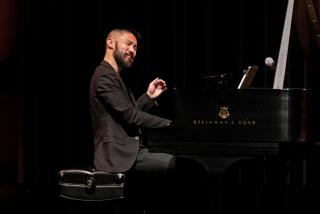Collector Makes Music on Water-Filled Glasses
- Share via
Beethoven and Mozart wrote two pieces each for the glasses; Hayden and Strauss at least one apiece.
Marie-Antoinette studied the glasses--her popularization of that musical instrument, unfortunately, interrupted by the coming of the French Revolution. And the glasses had their heyday in 18th-Century Vienna and 19th-Century Scotland, according to Jim Turner, 45, who, for the last eight years, has taken up the legacy where his predecessors had left off.
Turner grew up in Lewistown, Mont., a small community in which his father, a country doctor, sang and played the fiddle, accompanied by his mother on the violin and the piano. Like his brother and sister, who also went through a variety of musical instruments, Turner not only sang (he was a prize-winning soprano in grade school), but also played the piano, then the violin, then the flute and the clarinet.
In the ensuing years, Turner kept pursuing his motley collection of musical instruments--never, however, getting the true “quality of tone” he thought essential to his music. Until finally one day he remembered the pure tonal ring of the glasses he used to play as he was cleaning off the family dinner table.
First True Love
That day, about eight years ago, Turner decided to return, full time, to this, his first true love. (His second true love, wife Mary, came a year later.)
True, his adopted city of Philadelphia was not the most favorable environment in which to play the glasses. For one, Philadelphia had little apparent appreciation for the historical fact that the city’s foremost citizen, Benjamin Franklin, had played the glasses. Then, too, the long winters were inhospitable to sidewalk musicians, and even if he did make it to the top in that city, he would be, he decided, a relatively big fish in a relatively small pond.
It was time, Turner decided, to take to the road and bring the new music to the public at large. Soon afterward, he was featured on “The Tonight Show,” the “CBS Nightly News” and “Live From Lincoln Center,” among other broadcasts.
All this helped land him jobs as a guest musician with, among others, the National Symphony Orchestra conducted by Mstislav Rostropovich, the Baltimore Symphony Orchestra, the Denver Symphony Orchestra, the New Orleans Philharmonic, and--at long last--five times with the Philadelphia Orchestra.
Venice Beach Concerts
But more than any other place, Venice Beach exuded, he said, “a warmth and enthusiasm” that transcended anything he had experienced on the East Coast. And it is at Venice Beach that Turner does most of his playing.
Turner sets up about 50 assorted brandy snifters on a portable table, their stems securely fastened to the table’s surfaces by large rubber bands around their stems.
From a portable water tank, Turner fills the glasses about a third of the way, with the largest glass holding a gallon, and the smallest glass holding little more than a thimbleful. Then, wetting his fingers with the distilled water, which, he said, provides better friction and tonal qualities than ordinary tap water, Turner rubs the rims of the brandy snifters.
Turner’s biggest problem, he says, is glass breakage--he estimates he breaks a glass every two weeks, and he has nearly a hundred glasses in reserve, the majority of them still in a Philadelphia basement. Although he hasn’t had to buy any new glasses recently, he’s already “auditioned” some glasses at a local Pier 1, which, he says, have proven “perfectly acceptable.”
Purer, Sharper Tone
Plain glass, he maintains, is not only cheaper than cut crystal; it also produces a purer, sharper tone than crystal, which tends to echo.
In addition to performing on the Venice boardwalk and with assorted orchestras, Turner plays for parties, fairs and business conventions, including those of IBM, which, he says, flew him and his wife to Florida for two stints.
“If I were playing inconsequential music,” he said, “I probably wouldn’t be as devoted to this as I have been. But if I play Beethoven and Mozart, and play them well, with the wonder and joy of the specific sound of the glasses, then I’m fulfilling any musician’s dream . . . “
More to Read
The biggest entertainment stories
Get our big stories about Hollywood, film, television, music, arts, culture and more right in your inbox as soon as they publish.
You may occasionally receive promotional content from the Los Angeles Times.










